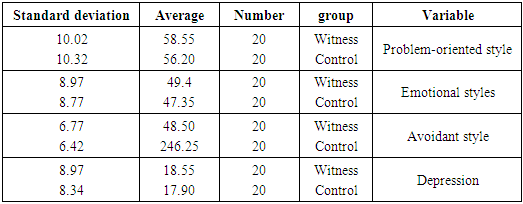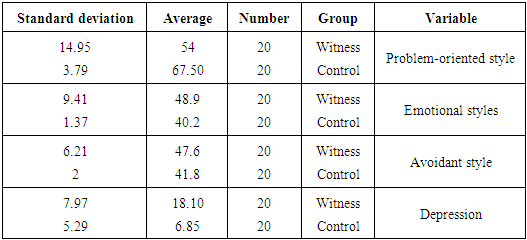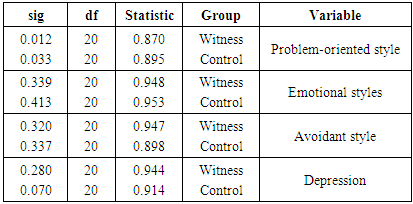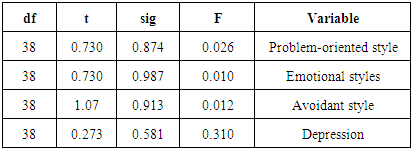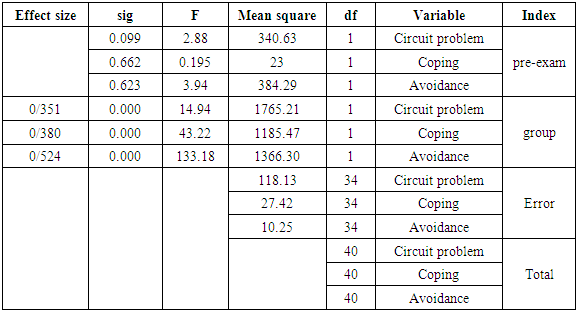-
Paper Information
- Previous Paper
- Paper Submission
-
Journal Information
- About This Journal
- Editorial Board
- Current Issue
- Archive
- Author Guidelines
- Contact Us
International Journal of Psychology and Behavioral Sciences
p-ISSN: 2163-1948 e-ISSN: 2163-1956
2017; 7(3): 94-98
doi:10.5923/j.ijpbs.20170703.06

The Effectiveness of Teaching Emotion Regulation Based on Gross Model on Coping and Depression Strategies in the Drug – Dependent People
Vali Rashidzadegan Doost1, Ali Kamkar2
1M.A in Department of Psychology, Yasouj Branch, Islamic Azad University, Yasouj, Iran
2Assistant Professor, Department of Psychology, Yasouj University of Medical Sciences, Yasouj, Iran
Correspondence to: Ali Kamkar, Assistant Professor, Department of Psychology, Yasouj University of Medical Sciences, Yasouj, Iran.
| Email: |  |
Copyright © 2017 Scientific & Academic Publishing. All Rights Reserved.
This work is licensed under the Creative Commons Attribution International License (CC BY).
http://creativecommons.org/licenses/by/4.0/

The drug abuse is one the most severe problems in the modern world that imposes huge costs on the international community. Today, the drug abuse and its unpleasant outcomes are among the most important general health problems, throughout the world. Accordingly, this study aimed to determine the effectiveness of teaching emotion regulation based on Gross Model on coping and depression strategies in the drug–dependent people. In this study as an experimental research, 40 subjects were selected randomly among drug-dependant people who referred to addiction quitting and treatment clinics and they were assigned to one of the experimental and control groups by the same method: control (n=20), experimental (n=20). The experimental group was treated in a group during 8 sessions that last 2 hours. The subjects were analyzed by depression questionnaire and coping strategies before beginning and after completing the treatment process. The control group received no intervention or Therapeutic help. The data were analyzed by statistical method of Covariance Analysis. The results indicated that Teaching Emotion Regulation Based on Gross Model was effective on appropriate usage of coping strategies and decreasing depression in drug –dependent People. The drug abusers has a lot of problems in regulating their emotions, thus teaching the emotion regulation and the correct usage of emotions to such people can be effective in decreasing and removing their problems.
Keywords: Emotion Regulation, Coping Strategies, Depression, Drug Abuse
Cite this paper: Vali Rashidzadegan Doost, Ali Kamkar, The Effectiveness of Teaching Emotion Regulation Based on Gross Model on Coping and Depression Strategies in the Drug – Dependent People, International Journal of Psychology and Behavioral Sciences, Vol. 7 No. 3, 2017, pp. 94-98. doi: 10.5923/j.ijpbs.20170703.06.
1. Introduction
- Substance abuse and addiction to the right of the people to scourge is known, is now one of the major concerns of human society has become. Even with the lack of acceptance of opiates in terms of social classes of people with this problem seriously involved, so that the health of individuals, families and communities at risk and also causes degeneration of mental and moral person [1]. In the conceptualization of addiction, this concept means the absence of progressive control over the behavior and insisted to continue such behavior despite adverse consequences, and taking meticulous material has been introduced, as well as addiction may be a lack of control Bradt of the non-associated [2] There is also growing evidence shows that drug use is associated with aggression and violent behavior [3]. Today, drug use various aspects of biological, psychological and social of people affected and one of the most common disorders related to psychiatry and psychology around the world and a crisis in the world today has become the international community threatened he does. Emotion regulation as one of the psychological variables, the attention of many researchers because substance abusers in regulating emotions and manage them many problems, and plays an important role in coping with stressful life events play [5]. The results have shown that the effective capacity to regulate emotions of happiness, psychological, physical and interpersonal influences [6]. Some of the findings also suggest that excessive regulation (controlled) by the excitement may increase negative affect, reduced inhibition against aggression, transferring decision-making processes, reduced social networks and increased physiological arousal caused the aggressive behavior [7]. Other studies show that dialectical behavior therapy that emotion regulation is one of its components can be significantly reduced aggression. The mechanism of influence of emotional regulation on aggression can be conceptualized such that the ability to regulate emotions as an integral part of normal development can be effective interpersonal interactions, decision making and adaptive behaviors cause. Having the ability to regulate emotions have a strong impact on the ability of self-regulation of individuals, self-regulation of all psychological processes that people need to function adaptively to do, refers to so emotional regulation by increasing self-control anger and aggression affect [8]. One of the problems in addiction and related disorders, substance abuse, psychotropic substances and alcohol can be seen, the variable depression. Another variable in this study was addressed. Although in most investigations, depression and addiction is considered as the most common, some researchers and scholars, depression and abusing one of the causes of disability and one of the consequences and effects of substance abuse as they [9]. Depression with features like high frequency, Generally, recurrent and chronic potential problems identified [10] In fact, the core symptoms of depression, the loss of interest or pleasure in daily activities and create negative emotions, stable and increasingly in person can This could indicate that disruption of one's emotions Play an important role in the development and persistence of depression [11].
2. Research Methodology
- In this quasi-experimental research method was used for the purpose of pre- and post-test design with a control group so we could have better control of confounding variables simultaneously.The population sample size and sampling:The population in this study were addicts were treated. The purpose of the patrons of rehab centers for cluster formation we have two groups of 20 persons. Assigned people in each group was randomly. To form groups of clients are eligible to take part in the study were randomly assigned to an experimental group and a control group established the two groups similar in have thus measure the dependent variable for both of them at the same time under an agreement was made.Data collection tool:To gather information and short form of the Beck Depression Inventory List was used to deal with stressful situations.1. Beck Depression InventoryBeck Depression Inventory to facilitate rapid implementation and management has been developed in clinical situations.
|
|
|
|
|
|
|
3. Discussion and Conclusions
- In this study, in conjunction with the first hypothesis concerning the effects of emotion regulation training on coping strategies Grass model drug-dependent persons, The results of analysis of covariance significant difference between the experimental and control groups in terms of coping strategies in eight treatments In drug-dependent individuals showed first hypothesis was confirmed. The findings of studies [18, 19, 21, 15 and 22] are aligned. Coping skills through cognitive performance [18] and the mechanisms of inhibition of stimulus, identifying triggers in high risk situations, loss of face events, activation of substance and managing stress and emotions, behaviors associated with substance abuse affects they [19]. This finding can be explained so that the teaching assignments substance abusers a sense of mastery and competence in individuals creates an incentive to increase the minimum retention in treatment or treatment is effective and avoiding high-risk behaviors. Several factors in the etiology of substance abuse are effective at interacting with each other, leading to the use of and then addiction, and in the meantime, some personality traits, which increase the risk of substance abuse. Low self-esteem, lack of social skills and adaptive use crude methods to deal with the stresses of life, including these features is dangerous. In this study [38], the Yaftd the fact that, as addicts in the event of a problem, problem-solving, Social support and less cognitive appraisal and coping strategies of physical control and emotional inhibition than normal subjects used. Addicts have low coping skills in problem solving and non-compliance are struggling with life's situations. They have low self-esteem and feelings of inadequacy. Explaining that this hypothesis can be found is an important factor in turning to abnormal behaviors psychological stress social and emphasized that what mental health and social functioning of individuals affects itself not stress, but the pattern of coping with stress [19]. In this study, the tasks that are substance abusers and guidance that took appropriate coping strategies and how to deal with the stresses of life were taught to clients. With regard to the second hypothesis concerning the effects of emotion regulation training gross model of depression in people dependent on drugs, the results of analysis of covariance significant difference between the experimental and control groups in terms of coping strategies in eight sessions of addicts show the And the second hypothesis was confirmed. The findings of the studies [25, 18, 9, 12 and 13, 14 and 24], is consistent. Studies and clinical and epidemiological studies have proved these considerations that drug use disorders are usually associated with depressive disorder in adolescents and adults [12]. During the research concluded that teaching emotion regulation severity of symptoms and depression and reduce their quality of life will improve and the follow up period as well as the results of existed and as a result that the researchers were included the disruption of emotions essential role in problems such as depression and anxiety [25]. In order to explain the results of this study should be noted that the depressed person's thinking negative thoughts about his own experience of current and future form. Negative thoughts about themselves are defective and incompetent belief that he is depressed and he believes that is defective, believes that happiness did not reach. Depressed people experience negative thoughts, including his interpretations of the events that happened to her that her negative obstacles to be impassable obstacles interprets the Even when the views of the more positive about his experience there. He most negative possible interpretation of what happened to him tends. Finally, the negative attitude depressed about the future attitude of helplessness. When he thinks about the future, believes that negative events now occur to him because of his personal shortcomings in the future will continue. Another explanation could be that the hypothesis is that some authors believe that the deficits in emotion regulation are not only a co-morbid depression But also a lasting risk factor for depressive episodes are repeated [16].
ACKNOWLEDGMENTS
- This article is extracted from my thesis under the title of “The Effectiveness of Teaching Emotion Regulation Based on Gross Model on Coping and Depression Strategies in the Drug – dependent People”. Hereby, I extend my sincere appreciation to Islamic Azad university of Yasouj for the efforts and supports they provided to me.
 Abstract
Abstract Reference
Reference Full-Text PDF
Full-Text PDF Full-text HTML
Full-text HTML